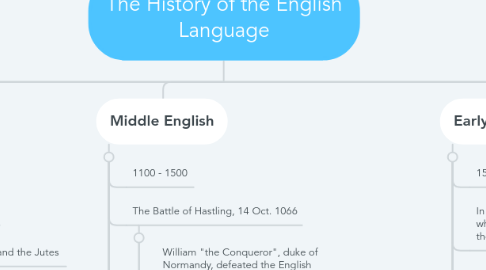
1. England before English
1.1. 55 BC - 600 AD
1.2. The arrival of the Celts into England
1.3. The Roman emperor, Julius Caesar attempted to invade England several times, with this conquering the land, with the only exception of the northern part of it.
1.4. Between 410 - 600, the Roman legions were withdraw, allowing the raids of tribes such as the Saxons, the Jutes, etc.
2. Old English
2.1. 600AD - 1100AD
2.2. Germanic invasion to England
2.2.1. The Saxons, the Angles and the Jutes
2.2.2. The Old english period is also referred as the Anglo-Saxon period, due to the strong Germanic and Saxon influence
2.3. Old english was synthetic
2.3.1. It inherited most phonological and morphological properties from Germanic
3. Middle English
3.1. 1100 - 1500
3.2. The Battle of Hastling, 14 Oct. 1066
3.2.1. William "the Conqueror", duke of Normandy, defeated the English king Harold II
3.2.1.1. The Norman conquest, changed drasticaly the political and social structures of England
3.2.1.1.1. Due to the political change of power of England, English became the "language of the lower classes", while French and Latin became the official language, spoken by the aristocrats.
3.2.2. In 1204, John "Lackland", lost his english possession in France, leading to a gradual decline of French as an Official language
3.3. The Black Death 1348 - 1351
3.3.1. One third of the population of England died due to the Great Bubonic Plague
3.3.1.1. The prestige of the English language rised as the language of the working class
3.4. The Hundred Years War 1337 - 1453
3.4.1. This lead to all continental holdings which lead to the English to no longer had important reason to learn and use French
3.5. The introduction of the Printing Press in 1476 by William Caxton
3.5.1. Standardization of the English language
3.6. The begining of colonization after the discover of America in 1492
3.6.1. This later lead to a global spread of the English language
3.7. Due to Latin and French influences, a new language had evolved by the mid 14th
3.7.1. Middle English
3.7.1.1. Germanic by the core, with an extense Roman vocabulary
3.8. By the end of the Middle English, the structural complexity of the Old English had disappeared
4. Early Modern English
4.1. 1500 - 1700
4.2. In 1509, Henry VIII ascended to the throne, who later, cutted the links with Rome and the Catholic Church
4.3. By 1500, English had begun to obtain a new position from a Regional European to a Global system of communication
4.4. The Great Vowel shift was completed, marking the end of the Middle English period
4.5. Due to the great influence of William Shakespeare, Early Modern English is also referred as Shakesperean English
4.6. By the end of Early Modern English, most of synthatic and morphological patterns had been stablished
4.6.1. Early Modern English was fairly analytic
4.6.1.1. The order of words, or grammar became fixed by the end of this period
4.6.1.1.1. Subject > Verb > Object
4.7. The phonological change of the Early Modern English
4.7.1. Between 1450 - 1650, five of the seven vowels of the middle english were raised, and two became diphtonguised
4.8. The revival of classical scolarship during the Renaissence brought Latin and Greek longwords into the language
4.8.1. Scientifics writters were often in need of new words, so they borrowed in abundence to these languages
5. Modern English
5.1. 1700 - Today
5.2. English developped from a regional language to the most used language in the world
5.3. By the end of the reign of Elizabeth I, English literature helped expand the language over the new world
5.4. The 3 circles of the English language over the world
5.4.1. The inner circle
5.4.1.1. Refers to traditional, historical, and sociolinguistic origins of english.
5.4.1.2. Countries that have English as a native language
5.4.1.2.1. U.K., U.S.A-, Australia, New Zealand, etc
5.4.2. The Outer Circle, includes countries colonized by Britain and the United States, where English is spoken as a second language
5.4.2.1. India, Nigeria, Singapur, etc
5.4.3. The Expanding Circle, includes countries that recognize English as an important foreing language.
5.4.3.1. El Salvador, Mexico, Russia, etc.
